Outdoor Learning Safer in the Pandemic
Air Date: Week of May 29, 2020
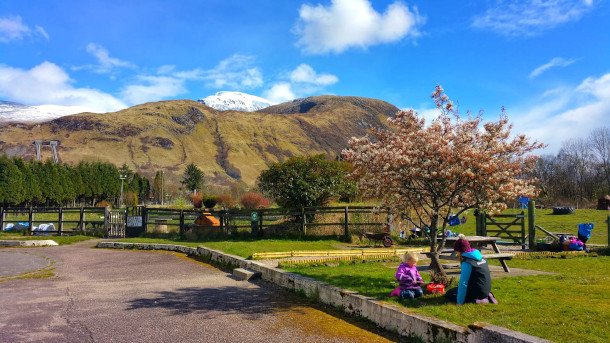
Stramash Nursery School is located in Scotland’s Highlands. (Photo: Courtesy of Cameron Sprague)
As schools and pre-schools prepare to reopen, some educators are considering the benefits of outdoor learning to help lower the risk of Covid-19 transmission. In Scotland, nature-based preschools were already popular before the pandemic. Cameron Sprague, a team leader at nature-based Stramash nursery school in Fort William, Scotland, spoke with Living on Earth’s Bobby Bascomb about how he and his fellow educators incorporate outdoor learning into their preschool curriculum, and the many benefits of outdoor education.
Transcript
CURWOOD: It’s Living on Earth, I’m Steve Curwood.
More than a century ago philosopher and psychologist John Dewey argued that children should be free to walk in and out of classrooms and go outside to learn on their own terms with practical hands-on experience. And today we know that sterilizing sunlight and moving air sharply reduce the transmissibility of the coronavirus and other respiratory diseases. So, some educators are looking again at the developmental advantages of outdoor education with the added value of reducing the risk of spreading infections. Preschoolers are notorious for bringing germs home, but it’s impractical to keep a mask on them or enforce distancing. So, some educators in Scotland are among those looking to add more outdoor education venues as a way to help keep kids and families healthy in light of the coronavirus pandemic. Nature-based pre-schools are already popular in this cold and rainy region. Cameron Sprague is a team leader at Stramash Nursery School in Fort William, Scotland and spoke with Living on Earth’s Bobby Bascomb.
BASCOMB: So Cameron, tell me about your school. What does it look like there?
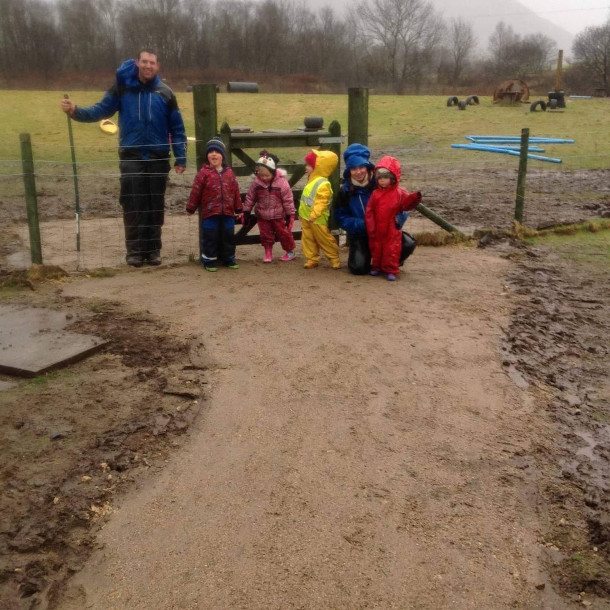
Children don their winter gear to prepare to learn outside on a cold, rainy day in Scotland. (Photo: Courtesy of Cameron Sprague)
SPRAGUE: I think one thing to do with outdoor education is that it doesn't mean you have to be in the woods and I think a lot of times people connect to that feeling. So we have a massive field that we affectionately called the Field of Dreams that is full of loose parts and play structures but within that is a shelter that is kind of a mix of a Mongolian Yurt, but we call it a yurkie with a porch on it. So the inside of the yurkie has a massive 15 kilowatt wood stove it has soft furnishings, big family dining room table, so it is like a family home. That's the feel we want to go for it's very Scandinavian. And attached to that is a big porch so the kids can come in, they can take their wet gear off and they can go through and warm up. And in addition to that, we have two basically adventure tent teepees that we can put up and take down so that the kids can be more mobile and sprint in and out of their wet stuff. But just to get out of wind and wet and be a bit warmer, they can do that. And throughout the site, there are sheltered areas with hammocks and things like that. So you can take a rest and get out of it, but still experience being outdoors as much as possible. And we're very much child-led practice. So children are their own decision makers and we just help facilitate their learning rather than directing and guiding and pushing.
BASCOMB: And how has Scotland's outdoor learning facilities in your school in particular how have they changed since the pandemic began if at all?
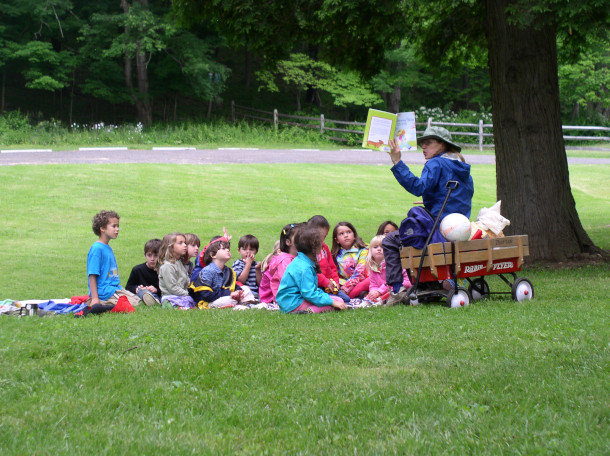
Children gather for storytime outdoors. (Photo: Wellspring Community School, Flickr, CC BY 2.0)
SPRAGUE: Yeah, so we and several other outdoor nurseries within Scotland are operating as what they’re calling hubs for frontline workers. So since the lockdown happened since March here, we've been open for nurses, children, police, utility workers, so that they can still you know, keep the country going and moving but they needed somewhere for the children to be. So it's been a change for us because it's one of the things we have to do is take younger children. So we've had children under two years old, we offered ourselves up because it made sense for us like an infection is not just going to spread outside as much. But what do we need to do? So things we've done is have PPE that we wear only on site and if it's leaving site, it gets bagged up and immediately washed. So that is something different for us, we might have just rocked up in a t-shirt and shorts on a nice day but now we have a total change of clothes for that. And we've always done really strict hand washing around meal times and after toileting. We've now increased that periodically throughout the day the children wash their hands additional times, and just making sure we're educating ourselves as much as possible and in talking to the children about it as well, but you can't get a two year old to socially distance, it's impossible and, and even just caring for them. You know, we had lots of talks about you know, should we wear face masks or not. And as a team we decided not to because you know, these kids were going through a huge transition, the whole world's changed around us. Whatever their routine was it is different, and we're trying to transition them and settle them into meeting totally new people. And we didn't think you could do that behind the mask very easily. Kids, especially nonverbal children respond to smiles and things like that so we made that decision. And that was really something that I'm glad we did, because I don't think it would have worked otherwise.
BASCOMB: Scotland's Children's Minister, Maree Todd has been a strong advocate of outdoor education from what I understand. She's even said that educating children outside could minimize the transmission of the virus. What do you think of that notion?
SPRAGUE: I 100% agree. I think Scotland has been moving practice outdoors. And that even before the pandemic, the expectation, especially in early years was that your children would be outdoors no matter what, and that's what the guidance has been coming out. But in terms of infection control, there's been research recently that's come out of Japan that said you're 19 times less likely to catch Coronavirus outdoors. China had similar research where they were looking at different spreading events and found only one that happened outdoors. And, you know, that's something naturally within our practice that, for example, we had a parent that my very first year with us nursery that, unfortunately came down with cancer and they pulled their child out of their kind of indoor setting and put them in here full time because they were worried about them picking up other bugs from children. So we kind of always knew that, you know, being in heated, non ventilated rooms is, you know, kind of a petri dish for picking up bugs and that's kind of just what happens in schools. But while being outside we're avoiding that.
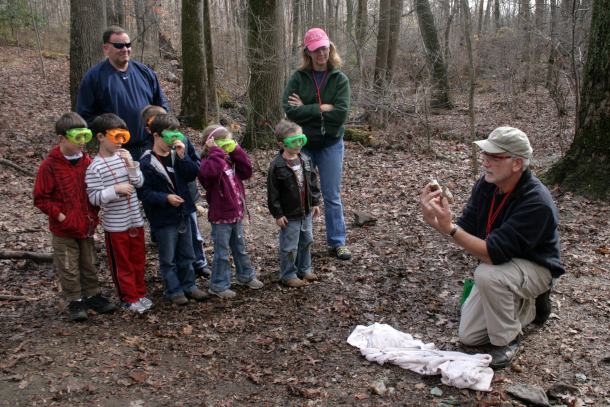
Outdoor education can encourage children to be more creative and ask more questions. (Photo: woodleywonderworks, Flickr, CC BY 2.0)
BASCOMB: Mm hmm. Yeah, that makes sense. Are there any other diseases that you're aware of that are maybe minimize you know, the transmission is minimized in an outdoor setting versus a classroom?
SPRAGUE: Well, I think even just common colds, chickenpox. Well like norovirus you know, there's been plenty of times when the schools in our surrounding area have had large numbers of children and staff that have been off sick and we just don't have it. It just doesn't happen.
BASCOMB: Now, what do you see as the advantages of nature based education as opposed to a more traditional school held inside of a classroom, you know, other than the health benefits that we've been talking about?
SPRAGUE: I think there's so much that just with lifestyles changing, that children are missing out, children are more sedentary than ever. And I know that goes with health and well being but your body is also linked to learning. They did research here when they were writing one of the Early Years Documents, and found kids are physically two years behind where they should be starting primary school, which is the equivalent of elementary here. And when you think that that's potentially half your life, you're physically behind where you should be. That's a scary thing. And that's stuff like your muscle tone not being developed so that you can actually hold a pencil and learn to write. Your emotional regulation and audio visual systems are linked to your core muscles and if those are underdeveloped, then you might get diagnosed with ADHD when really you're just haven't had a chance to build your body and mature and settle into your yourself. It's emotional well being as well NHS in Highland where I am, has been prescribing at least for a year outdoor time for mental well being and just help him get outside. One of the other big things for us for kids is kids are losing creativity. So being outside playing with loose parts, all those kinds of things that we do we're giving children that foundation to be creative and going to school and be inquisitive, actually questioning and asking and you know, a lot of times people say oh, I want them to be school ready. And really they mean compliant, like sit down and do what I'm told. And really, we want our kids ready to learn and have life skills and that's what being outside allows them to do.
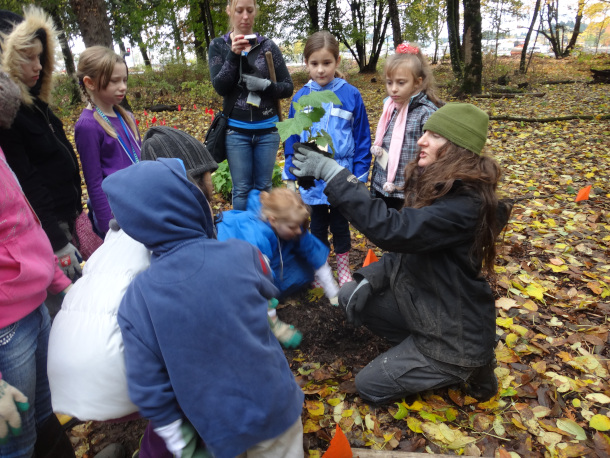
Children who learn through outdoor education show fewer instances of obesity, diabetes and ADHD. (Photo: USFWS - Pacific Region, Flickr, CC BY-NC 2.0)
BASCOMB: And what about outdoor education and, you know, self esteem and social skills, that sort of thing. Do you find there's a significant difference there?
SPRAGUE: Yeah, absolutely. And I think kids climbing trees using fire, all that kind of stuff there is an element of risk in it but what also comes from it is confidence and self esteem. You know, I did that I made that happen. I climbed that tree, all those kind of things. And one of the things that as adults and I guess maybe Western society does is underestimate the capabilities of children big time. And for one of our rules is, we don't put children into anything even a swing because we want them to develop the skills and problem solve and be physically ready to be in things and then we know we're safe. If we let them build those skills themselves, then they're safe to be up there. And then they get that confidence boost that self esteem boost because I did it and that's exciting and then we're there to celebrate it with them.
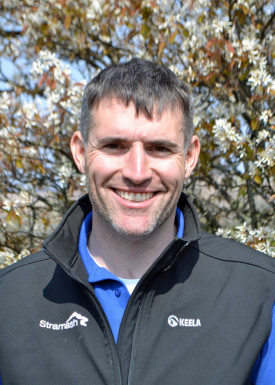
Cameron Sprague is a team leader at Stramash Nursery School in Fort William, Scotland. (Photo: Courtesy of Cameron Sprague)
BASCOMB: Yeah, it sounds like there's a lot of benefits across the board. I live in New Hampshire and a lot of the northern half of the United States anyway, it's really cold in the wintertime. You know, I think it might be a tough sell for students and teachers for that matter to get outside in December, January to teach math. You know, what would you say to that?
SPRAGUE: I would say you just need to think of different materials I guess. It's the old Scandinavian saying there's no bad weather just bad clothing. So it's dressing appropriately taking precautions we use things like tipis which you can put fires in, so kids can dip in and out and warm up. So there's always options and ways to keep children safe. Yeah, lightning, hurricanes. Yeah, you're, outside teaching math, but on a normal cold, windy wet day then yes you can be.
CURWOOD: Cameron Sprague is a team leader at Stramash Nursery School in Fort William, Scotland and spoke with Living on Earth’s Bobby Bascomb.
Links
The Guardian | “Scotland Eyes Outdoor Education as Model for Opening Schools”
Living on Earth wants to hear from you!
Living on Earth
62 Calef Highway, Suite 212
Lee, NH 03861
Telephone: 617-287-4121
E-mail: comments@loe.org
Newsletter [Click here]
Donate to Living on Earth!
Living on Earth is an independent media program and relies entirely on contributions from listeners and institutions supporting public service. Please donate now to preserve an independent environmental voice.
NewsletterLiving on Earth offers a weekly delivery of the show's rundown to your mailbox. Sign up for our newsletter today!
 Sailors For The Sea: Be the change you want to sea.
Sailors For The Sea: Be the change you want to sea.
 The Grantham Foundation for the Protection of the Environment: Committed to protecting and improving the health of the global environment.
The Grantham Foundation for the Protection of the Environment: Committed to protecting and improving the health of the global environment.
 Contribute to Living on Earth and receive, as our gift to you, an archival print of one of Mark Seth Lender's extraordinary wildlife photographs. Follow the link to see Mark's current collection of photographs.
Contribute to Living on Earth and receive, as our gift to you, an archival print of one of Mark Seth Lender's extraordinary wildlife photographs. Follow the link to see Mark's current collection of photographs.
 Buy a signed copy of Mark Seth Lender's book Smeagull the Seagull & support Living on Earth
Buy a signed copy of Mark Seth Lender's book Smeagull the Seagull & support Living on Earth

